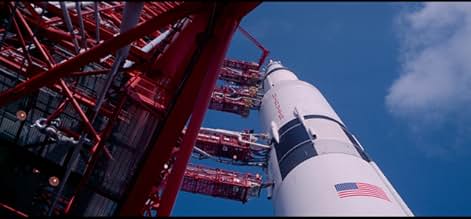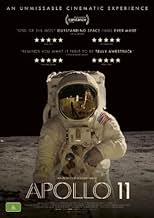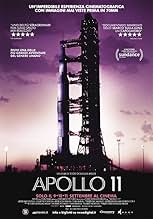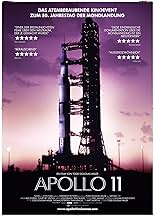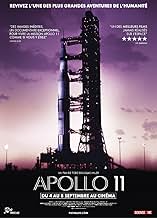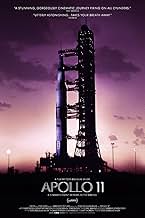IMDb-BEWERTUNG
8,1/10
27.846
IHRE BEWERTUNG
Ein Blick auf die Apollo 11-Mission auf dem Mond, unter der Leitung von Kommandant Neil Armstrong und Buzz Aldrin & Michael Collins Piloten landen.Ein Blick auf die Apollo 11-Mission auf dem Mond, unter der Leitung von Kommandant Neil Armstrong und Buzz Aldrin & Michael Collins Piloten landen.Ein Blick auf die Apollo 11-Mission auf dem Mond, unter der Leitung von Kommandant Neil Armstrong und Buzz Aldrin & Michael Collins Piloten landen.
- 3 Primetime Emmys gewonnen
- 59 Gewinne & 45 Nominierungen insgesamt
Neil Armstrong
- Self - Mission Commander
- (Archivfilmmaterial)
Mike Collins
- Self - Command Module Pilot
- (Archivfilmmaterial)
Buzz Aldrin
- Self - Lunar Module Pilot
- (Archivfilmmaterial)
- (as Edwin 'Buzz' Aldrin)
Deke Slayton
- Self - Director of Flight Crew Operations
- (Archivfilmmaterial)
Clifford E. Charlesworth
- Self - Flight Director Green Team
- (Archivfilmmaterial)
Bruce McCandless II
- Self - Capsule Commuicator (CAPCOM) Green Team
- (Archivfilmmaterial)
- (as Bruce McCandless)
Charles Duke
- Self - Capsule Communicator (CAPCOM) White Team
- (Archivfilmmaterial)
Gene Kranz
- Self - Flight Director White Team
- (Archivfilmmaterial)
Jim Lovell
- Self - Backup Commander
- (Archivfilmmaterial)
John F. Kennedy
- Self - President of the United States of America
- (Archivfilmmaterial)
Janet Armstrong
- Self
- (Archivfilmmaterial)
Patricia Mary Finnegan
- Self
- (Archivfilmmaterial)
Andy Aldrin
- Self
- (Archivfilmmaterial)
Joan Ann Archer
- Self
- (Archivfilmmaterial)
- (Nicht genannt)
Walter Cronkite
- Self
- (Archivfilmmaterial)
- (Nicht genannt)
Lyndon B. Johnson
- Self
- (Archivfilmmaterial)
- (Nicht genannt)
Handlung
WUSSTEST DU SCHON:
- WissenswertesSeveral of the recordings captured by the astronauts during the mission are featured in this documentary. These recordings by Neil Armstrong, Buzz Aldrin and Mike Collins earned them honorary memberships in the American Society of Cinematographers.
- PatzerThe incident involving Buzz Aldrin's bio-med sensors going out, leading him to crack wise, saying, "I promise I will let you know if I stop breathing," occurred during the return voyage, on day 8 of the mission, but is depicted (at approx 48 minutes into the film) as happening during the approach to the moon before the separation of the command and lunar modules.
- Zitate
Neil Armstrong: One small step for man... one giant leap for mankind.
- Alternative VersionenIn 2019, an edited version of the film, cut down to 45 minutes for exhibition in museum IMAX theaters, was released as Apollo 11: First Steps.
- VerbindungenFeatured in WatchMojo: Top 10 Best Movies of 2019 (So Far) (2019)
- SoundtracksMother Country
Written and Performed by John Stewart
Ausgewählte Rezension
A half-century ago, Neil Armstrong stepped off the ladder of the Lunar Module Eagle and into the history books. In the decades since, that moment and the flights of NASA's Apollo program have been chronicled in seemingly countless documentaries. At the top of that list remains 1989's For All Mankind from the late Al Reinert and 2007's In The Shadow Of The Moon from British filmmakers David Sington and Christopher Riley. Up there with them now is 2019's Apollo 11, an exciting new film from Todd Douglas Miller that is begging for you to see it on the biggest screen possible.
Why?
In part because of Miller who, like those other great filmmakers of Apollo before him, wasn't content to merely do a rehash of what had come before. Miller's Apollo 11 is in part a deep dive into the NASA archives, uncovering things that even the most seasoned space enthusiast has likely never seen before. There's a wealth of pre-launch footage, for example, tracing the preparations from the rollout of the massive Saturn V rocket to the launch pad to multiple perspectives of the launch itself. Even when events move into space, there's still a wealth of rare material to experience including conversations between the astronauts themselves as well as between them and Mission Control in Houston. Even where footage that has become synonymous with the mission and the era such as the stage separations of the rocket or the Lunar Module's descent to the surface of the Moon, it's presented with clarity and scale rarely seen elsewhere. For that alone, the film renders excellent service.
It does so in other ways, as well. Unlike those two documentaries I mentioned at the top of this review, Miller doesn't use astronaut interviews (either aural or visual) to help tell the story. Instead, Apollo 11 unfolds entirely through archival sources ranging from the transmissions to the voice of NASA's public affairs or well-known TV commentators like Walter Cronkite. To help aid visually for parts of the mission where there isn't much or anything to show, the film employees simple animation alongside such commentaries. The film also makes effective use of split-screen and captions to portray mission control or to show events such as the actual walk on the Moon from multiple perspectives. As much as the footage itself on a cinema screen does, it presents the sheer scale of the endeavor but without losing the viewer in the technicalities involved in spaceflight.
In some ways, that's the greatest triumph of Apollo 11 the documentary. It's a film keen to present Apollo 11 the mission in awe-inspiring yet understandable terms, one that emphasizes how incredible in scope and achievement that flight five decades ago this July was. It's also a reminder, at a time when cinema screens find themselves increasingly dominated by would-be blockbusters and superhero flicks, of the raw power of cinema to present stories. Both of those are things we need reminding of, it seems, and the film does a superb job of both.
Why?
In part because of Miller who, like those other great filmmakers of Apollo before him, wasn't content to merely do a rehash of what had come before. Miller's Apollo 11 is in part a deep dive into the NASA archives, uncovering things that even the most seasoned space enthusiast has likely never seen before. There's a wealth of pre-launch footage, for example, tracing the preparations from the rollout of the massive Saturn V rocket to the launch pad to multiple perspectives of the launch itself. Even when events move into space, there's still a wealth of rare material to experience including conversations between the astronauts themselves as well as between them and Mission Control in Houston. Even where footage that has become synonymous with the mission and the era such as the stage separations of the rocket or the Lunar Module's descent to the surface of the Moon, it's presented with clarity and scale rarely seen elsewhere. For that alone, the film renders excellent service.
It does so in other ways, as well. Unlike those two documentaries I mentioned at the top of this review, Miller doesn't use astronaut interviews (either aural or visual) to help tell the story. Instead, Apollo 11 unfolds entirely through archival sources ranging from the transmissions to the voice of NASA's public affairs or well-known TV commentators like Walter Cronkite. To help aid visually for parts of the mission where there isn't much or anything to show, the film employees simple animation alongside such commentaries. The film also makes effective use of split-screen and captions to portray mission control or to show events such as the actual walk on the Moon from multiple perspectives. As much as the footage itself on a cinema screen does, it presents the sheer scale of the endeavor but without losing the viewer in the technicalities involved in spaceflight.
In some ways, that's the greatest triumph of Apollo 11 the documentary. It's a film keen to present Apollo 11 the mission in awe-inspiring yet understandable terms, one that emphasizes how incredible in scope and achievement that flight five decades ago this July was. It's also a reminder, at a time when cinema screens find themselves increasingly dominated by would-be blockbusters and superhero flicks, of the raw power of cinema to present stories. Both of those are things we need reminding of, it seems, and the film does a superb job of both.
- timdalton007
- 23. März 2019
- Permalink
Top-Auswahl
Melde dich zum Bewerten an und greife auf die Watchlist für personalisierte Empfehlungen zu.
Details
- Erscheinungsdatum
- Herkunftsland
- Offizielle Standorte
- Sprache
- Auch bekannt als
- Apollo 11: First Steps
- Drehorte
- Sea of Tranquility, The Moon, Space(Apollo 11 landing site)
- Produktionsfirmen
- Weitere beteiligte Unternehmen bei IMDbPro anzeigen
Box Office
- Bruttoertrag in den USA und Kanada
- 9.039.891 $
- Eröffnungswochenende in den USA und in Kanada
- 1.607.040 $
- 3. März 2019
- Weltweiter Bruttoertrag
- 15.343.649 $
- Laufzeit1 Stunde 33 Minuten
- Farbe
- Sound-Mix
- Seitenverhältnis
- 2.20 : 1
Zu dieser Seite beitragen
Bearbeitung vorschlagen oder fehlenden Inhalt hinzufügen







